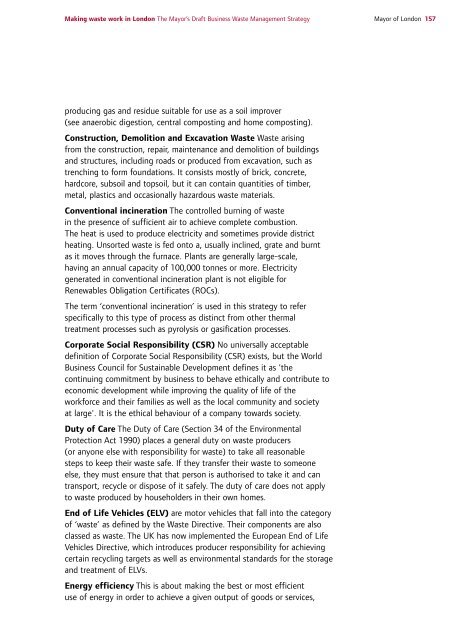Draft Business Waste Strategy PDF - london.gov.uk - Greater ...
Draft Business Waste Strategy PDF - london.gov.uk - Greater ...
Draft Business Waste Strategy PDF - london.gov.uk - Greater ...
Create successful ePaper yourself
Turn your PDF publications into a flip-book with our unique Google optimized e-Paper software.
Making waste work in London The Mayor’s <strong>Draft</strong> <strong>Business</strong> <strong>Waste</strong> Management <strong>Strategy</strong> Mayor of London 157<br />
producing gas and residue suitable for use as a soil improver<br />
(see anaerobic digestion, central composting and home composting).<br />
Construction, Demolition and Excavation <strong>Waste</strong> <strong>Waste</strong> arising<br />
from the construction, repair, maintenance and demolition of buildings<br />
and structures, including roads or produced from excavation, such as<br />
trenching to form foundations. It consists mostly of brick, concrete,<br />
hardcore, subsoil and topsoil, but it can contain quantities of timber,<br />
metal, plastics and occasionally hazardous waste materials.<br />
Conventional incineration The controlled burning of waste<br />
in the presence of sufficient air to achieve complete combustion.<br />
The heat is used to produce electricity and sometimes provide district<br />
heating. Unsorted waste is fed onto a, usually inclined, grate and burnt<br />
as it moves through the furnace. Plants are generally large-scale,<br />
having an annual capacity of 100,000 tonnes or more. Electricity<br />
generated in conventional incineration plant is not eligible for<br />
Renewables Obligation Certificates (ROCs).<br />
The term ‘conventional incineration’ is used in this strategy to refer<br />
specifically to this type of process as distinct from other thermal<br />
treatment processes such as pyrolysis or gasification processes.<br />
Corporate Social Responsibility (CSR) No universally acceptable<br />
definition of Corporate Social Responsibility (CSR) exists, but the World<br />
<strong>Business</strong> Council for Sustainable Development defines it as 'the<br />
continuing commitment by business to behave ethically and contribute to<br />
economic development while improving the quality of life of the<br />
workforce and their families as well as the local community and society<br />
at large'. It is the ethical behaviour of a company towards society.<br />
Duty of Care The Duty of Care (Section 34 of the Environmental<br />
Protection Act 1990) places a general duty on waste producers<br />
(or anyone else with responsibility for waste) to take all reasonable<br />
steps to keep their waste safe. If they transfer their waste to someone<br />
else, they must ensure that that person is authorised to take it and can<br />
transport, recycle or dispose of it safely. The duty of care does not apply<br />
to waste produced by householders in their own homes.<br />
End of Life Vehicles (ELV) are motor vehicles that fall into the category<br />
of ‘waste’ as defined by the <strong>Waste</strong> Directive. Their components are also<br />
classed as waste. The UK has now implemented the European End of Life<br />
Vehicles Directive, which introduces producer responsibility for achieving<br />
certain recycling targets as well as environmental standards for the storage<br />
and treatment of ELVs.<br />
Energy efficiency This is about making the best or most efficient<br />
use of energy in order to achieve a given output of goods or services,
















